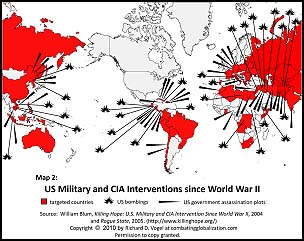We’ve witnessed a sustained Western media attention to the alleged interference by Russia (Putin) in American politics in favour of President Trump’s election. The same media seem to find it less interesting to write about US meddling in the political affairs, including elections, in other countries. But scattered articles—good ones—do exist.
This biased media attention supports a typical psycho-political projection: Look what bad things they are doing (omitted: that we have done much more and worse ourselves).
Look at the Time cover above from 1996, the time of the Clinton administration. There is a very good article with links and a PDF on OffGuardian here. It’s a mind-boggling story about how five Americans were tasked with influencing the election of Boris Yeltsin in competition with other candidates who, when they started working in Moscow, had much higher poll figures than he had.
This was a couple of years after Bill Clinton had broken all important Western politicians promises to Mikhail Gorbachev to the effect that NATO would not expand “an inch” and started doing exactly that—a process that ended with the crisis and tension in today’s Ukraine.
Fortunately, there are Western media that have told you quite a bit about US meddling in the elections and other political affairs of other countries:
Los Angeles Times The US is no stranger to interfering in the elections of other countries –“it’s done so as many as 81 times between 1946 and 2000, according to a database amassed by political scientist Don Levin of Carnegie Mellon University. That number doesn’t include military coups and regime change efforts following the election of candidates the US didn’t like, notably in Iran, Guatemala and Chile. Nor does it include general assistance with electoral processes, such as election monitoring.”
Jan Oberg and his wife, Dr. Christina Spännar, are founders of The Transnational Foundation, TFF. Born in 1951, he is a Danish citizens living in Lund, Sweden, since 1971 and he is an internationally respected peace researcher, mediator and peace commentator as well as an art photographer.
Before you get too excited about Russia’s meddling in US politics
Posted on February 22, 2018 by Jan Oberg
We’ve witnessed a sustained Western media attention to the alleged interference by Russia (Putin) in American politics in favour of President Trump’s election. The same media seem to find it less interesting to write about US meddling in the political affairs, including elections, in other countries. But scattered articles—good ones—do exist.
This biased media attention supports a typical psycho-political projection: Look what bad things they are doing (omitted: that we have done much more and worse ourselves).
Look at the Time cover above from 1996, the time of the Clinton administration. There is a very good article with links and a PDF on OffGuardian here. It’s a mind-boggling story about how five Americans were tasked with influencing the election of Boris Yeltsin in competition with other candidates who, when they started working in Moscow, had much higher poll figures than he had.
This was a couple of years after Bill Clinton had broken all important Western politicians promises to Mikhail Gorbachev to the effect that NATO would not expand “an inch” and started doing exactly that—a process that ended with the crisis and tension in today’s Ukraine.
Fortunately, there are Western media that have told you quite a bit about US meddling in the elections and other political affairs of other countries:
Huffington Post
“The US has been meddling in other countries’ elections for a century. It doesn’t feel good.”
Los Angeles Times
The US is no stranger to interfering in the elections of other countries
–“it’s done so as many as 81 times between 1946 and 2000, according to a database amassed by political scientist Don Levin of Carnegie Mellon University. That number doesn’t include military coups and regime change efforts following the election of candidates the US didn’t like, notably in Iran, Guatemala and Chile. Nor does it include general assistance with electoral processes, such as election monitoring.”
The Los Angeles Times has also covered Russia’s meddling in the affairs of other countries offering examples but not comparative statistics.
Washington Post
The long history of the US interfering with elections elsewhere.
This article states that the US and Russia interfered 117 times in the period covered by the analysis by Don Levin mentioned above. That would mean 36 cases for Russia.
USA Today
Alleged Russian political meddling documented in 27 countries since 2004. (More or less documented, one might add).
Wikipedia carries a well-documented page on US involvement in regime change 1846 to 2017—quite a list.
The US Global Policy Forum has this list of US Military and Clandestine Interventions in Foreign Countries 1798–2005—184 for the whole period, of which 81 already before 1900.
And, finally, here is William Blum’s intervention map based on his classical study Killing Hope from 2004:
classical study Killing Hope from 2004:
Jan Oberg and his wife, Dr. Christina Spännar, are founders of The Transnational Foundation, TFF. Born in 1951, he is a Danish citizens living in Lund, Sweden, since 1971 and he is an internationally respected peace researcher, mediator and peace commentator as well as an art photographer.